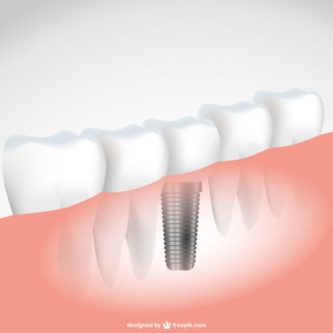SHARES

When you lose your teeth, your dentist may recommend dental implants to replace the missing teeth. You may ask, what are the benefits, the risks and am I a suitable candidate?
What are dental implants?
A dental implant is a titanium screw implanted in the jawbone surgically, functioning as the root of a tooth. This dental implant becomes a sturdy base to support one or more artificial teeth. Dental implants have been getting increasingly popular these days as they are the closest you can get to natural teeth.
How can dental implants preserve jaw bone loss?
Bone in the jaw requires stimulation from everyday function such as chewing to maintain its form and density. Hence, when teeth are lost, lack of stimulation will cause shrinkage of jaw bone, leading to functional and aesthetic issues in the long run. For example, tooth loss may lead to facial sagging and problems with dentures due to insufficient bone. Therefore, one of the primary reasons to consider dental implants is to maintain and preserve the jawbone. Dental implants fuse to the bone which stabilize it and prevent further bone loss.
How will dental implants be placed?
In most cases, a dental team of various specialties carries out the procedure when placing a dental implant. The treatment planning includes compiling study models of your teeth, x-rays and 3D computerized tomograms (CT scans). This is important to ensure placing the dental implant in the exact position in the bone and to determine the condition of your bone. If there is inadequate bone volume, the dental surgeon may carry out certain dental procedures to regenerate (regrow) bone thus ensuring sufficient anchorage for the dental implant.
Placement of a dental implant is a surgical procedure in which the implant is fitted into the bone using a surgical guide. The success of a dental implant depends on the intimate contact between the implant and the bone. Depending on the situation, dental implants may take up to several months to fuse to the bone before they can have artificial teeth attached to them.
Am I a suitable candidate for dental implants?
Generally, anyone with missing teeth is a candidate for dental implants. Nevertheless, there are some conditions or diseases which may affect the outlook of dental implants. For example, uncontrolled diabetes, cancer, smoking habit or severe gum diseases may affect the success of dental implants. Hence, it is important to let your dental surgeon be aware of your health status to ensure you are fit for dental implants.
Are there any risks to dental implants and how long will they last?
Dental implants which are fitted to healthy and strong bone can last for many years. Like natural teeth, they will function as long as you take good care of them. Having said that, there is no lifetime guarantee just as with other surgical implants such as a knee or hip replacement. Rarely, there are some possible complications caused by dental implants which include bleeding, infection, injury or numbness to the nearby muscles or structures.
How do I care for dental implants?
Meticulous oral hygiene is essential for the long-term success of dental implants. Caring for artificial teeth attached to your dental implant is just like caring for your natural teeth. Here are some oral care tips for dental implants:
- Good oral hygiene
Proper brushing technique twice a day. Interdental brushing is important to help clean areas around your implants. Using antibacterial mouth rinses help to reduce the number of bacteria in your oral cavity.
- Quit smoking
Smoking can alter your bone structure and lead to implant failure.
- Regular dental visits
Regular check-ups and cleanings (every six months) can help ensure your implant is in good condition.
Conclusion
Dental implant is a safe and well-established treatment. Hence, approach a dentist today to see if dental implant is the right choice for you. Your dental team will work together to provide you with the best treatment plan.
If you would like to make an appointment with a Dental Surgeon:
Find a Dental Surgeon in Malaysia, on GetDoc
Find a Dental Surgeon in Singapore, on GetDoc
by Soh May Leng
Born and raised in Malaysia, May Leng obtained her Bachelor of Dental Surgery from the University of Otago, New Zealand. She has joined the GetDoc team to relay valuable health information to the public. Staying active plays a big part in her daily life especially through outdoor sports such as running and swimming. She also enjoys travelling and has a passion for photography. View all articles by Soh May Leng.







